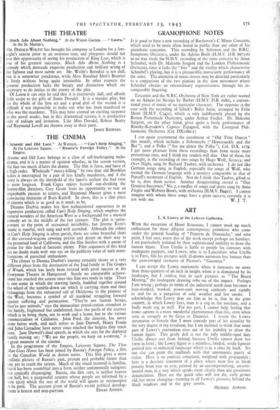ART
L. S. Lowry at the Lefevre Galleries.
WITH the exception of Henri Rousseau, I cannot work up much enthusiasm for those diligent contemporary primitives who come under the general heading of " Peintres de Dimanche," and who paint, I feel sure, every day of the week except perhaps on Sundays. I am particularly irritated by their sophisticated inability to draw the human figure. Even Utrillo is liable to people his canvases with inadequate puppets, and Lowry, who is to Lancashire what Utrillo is to Paris, fills his pictures with ill-drawn automata less human than the pain-ravaged creatures of Picasso's " Guernica."
I can accept the Lowry marionette when it measures no more than three-quarters of an inch in height, when it is dominated by its landscape, but I confess,. that in such pictures as "The Board Meeting," the inadequate drawing robs me of the impact. Perhaps I am wrong ; perhaps in terms of the industrial north man becomes a lean-shanked, masked, power-unit moving aimlessly and rapidly to and fro in a purgatory of cold weather and hot smoke. I acknowledge that Lowry may see him as he is, that in the grim country, in which Lowry lives, man is a cog in the machine, and a badly made cog as well. For my part, I cannot help feeling that homo sapiens is a more wonderful phenomenon than this, even when seen as savagely as by Goya or Daumier. I resent the Lowry automaton so fiercely that I must concede part of his actuality by the very degree of my revulsion, but I am inclined to think that some part of Lowry's convention rises out of his inability to draw the human figure. This grisly doll is not the jolly middle-aged lady Utrillo always sees from behind, because Utrillo cannot draw her form in front ; the Lowry figure is a mindless, herded, seedy figment painted into an industrial landscape which is in a class by itself. No one else can paint the midlands with that unromantic purity of vision. Here is no partisan complaint, weighted with propaganda; here is a desolate statement of a place where men live in bleak poverty from year to year, painted by an uncompromising, unsenti- mental man, in a way which speaks more clearly than any passionate denunciation. Here are the quick who will not die, early grown old, but never changing—teeming in all Lowry's pictures, behind the black windows and in the grey streets. MICHAEL MirroN.


























 Previous page
Previous page